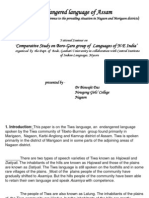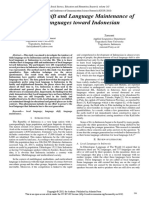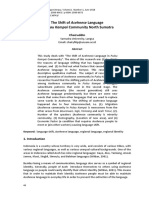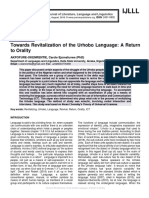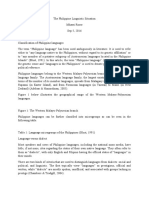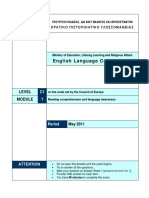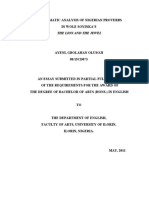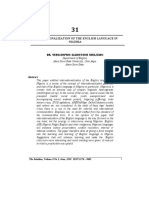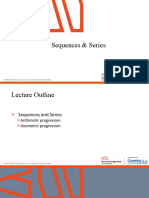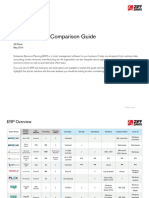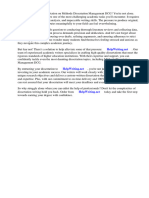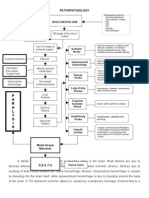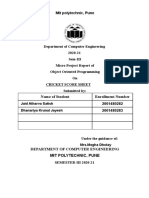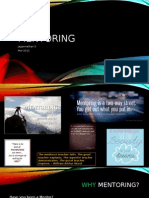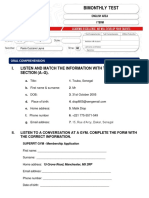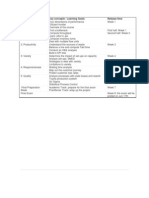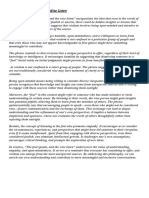Professional Documents
Culture Documents
Minority Language Maintenance: The Case of The Efik Language in South Eastern Nigeria
Uploaded by
Sylvester sampsonOriginal Title
Copyright
Available Formats
Share this document
Did you find this document useful?
Is this content inappropriate?
Report this DocumentCopyright:
Available Formats
Minority Language Maintenance: The Case of The Efik Language in South Eastern Nigeria
Uploaded by
Sylvester sampsonCopyright:
Available Formats
ISSN 1799-2591
Theory and Practice in Language Studies, Vol. 2, No. 12, pp. 2491-2499, December 2012
© 2012 ACADEMY PUBLISHER Manufactured in Finland.
doi:10.4304/tpls.2.12.2491-2499
Minority Language Maintenance: The Case of the
Efik Language in South Eastern Nigeria
Offiong Ani Offiong
Department of Linguistics and Communication studies, University of Calabar, Calabar, Nigeria
Email: Offiongani2002@yahoo,com
Mercy I. Ugot
Centre for General Studies, Cross River State University of Technology, Calabar, Nigeria
Email: mercyugot@yahoo.com
Abstract—Language maintenance is a common feature amongst minority group and it is a phenomenon which
will retard whole language shift for a minority language group. Language maintenance will only be possible if
there is a high degree of contacts with a very influential language like English and conscious efforts by the
language group itself. This paper examines the maintenance of the Efik language being a minority language in
Nigeria, looking at the fact that the language is endangered. It takes into account some of the factors that lead
to language endangerment worldwide and how to improve, standardize, revive, modernize its lexicon and
ginger the Efik speakers. The Efik community of speakers have become bilingual over the years in the English
language and are gradually shifting allegiance to English therefore losing their original heritage. We have used
the ‘reversing language shift theory’ by Fishman (1991) as a framework to propose a checkmate to the
extinction and the gradual shift the Efik language is experiencing. This paper highlights some preventive
measures for the Efik language to be able to overcome the danger of losing domains in today’s flow of
globalization.
Index Terms—Efik, language maintenance, endangerment, globalization, extinction and shift
I. INTRODUCTION
The Efik language is one of the very numerous languages spoken in Nigeria. Grimes (2000) estimates that there are
about five hundred (500) Nigerian languages. Of these, Hausa, Igbo and Yoruba are the very major languages spoken
because they span through a vast expanse of land which covers about seventy percent (70%) of the entire county. Also
the population of the speakers are approximately ninety seven million (97,000,000) of the one hundred and fifty million
(150,000,000) Nigerians. This shows that Efik is a minority language as we look at the sociology of Nigerian languages.
The country has thirty six states in its federation units and Cross River is one of them. Over the years, Cross River State
Community in Nigeria has been transformed from being predominantly bilingual to becoming a dynamic multilingual
society. Udoh and Okon (2008, pp. 54-56) confirms that the number of languages spoken in Cross River State are about
thirty five (35) from a census carried out by them. Of all of these languages, Efik is the most developed not because of
its population but because of its early contact with the early European missionaries who brought in education and
religion to placate the people of the area because of the slave trade business that was seen as unethical in the 16th, and
17th and 18th centuries. The coastal position of the Efik people allowed for the easy access and contact with these traders
and later missionaries and educationists.
The Efik people who speak Efik language are situated in the South –South of Nigeria. Efik is a minority group
language spoken in Southern Cross River, Nigeria. It is predominantly the speech form of Calabar Municipality,
Calabar South, Odukpani, Akpabuyo and Bakassi local Government Areas. It is a second language to the surrounding
neighbouring people and culture. Faraclass (1989) approximates that Efik has 360,000 speakers as first language and 2
million speakers as second language. The language has been variously classified as a member of the Lower-Cross group,
of the Delta-Cross sub-family, which is an off shoot of the enlarged Cross River sub-branch that is a major constitution
of the Benue-Congo family of the Niger Congo phylum (Faraclass 1989, Essien 2001, William and Blench 2000,
Mensah 2010).
Numerous problems such as language endangerment, the loss experienced and factors contributing to language shift
noticeable in Efik elicited the study of this paper. These problems are not peculiar to the Efik language, but to nearly all
minority languages of the world. In trying to solve these problems, we believe we will come out with solutions of
maintenance of the language.
As mentioned, one of the major concerns of this paper bothers on maintenance of the Efik language which is a
minority language in Nigeria. In the midst of Efik, English, Ibibio, Ejagam, Lokaa and Bekwarra, are largely spoken
within and around the domain of the Cross River State Southern Senatorial District. If the Efik people do not maintain
their language, then there is the tendency of experiencing language shift. Hoffman (1998) has observed that under
© 2012 ACADEMY PUBLISHER
2492 THEORY AND PRACTICE IN LANGUAGE STUDIES
certain cultural, social and political conditions, a community might opt to change one set of linguistic tools for another.
Efik language is not opting to shift to another language, but is faced with the predicament of other languages
dominating it. The Efik community is not immune to the language loss phenomenon, but this study stands out as one of
the first to charge the community of being aware and conscious of language shift and eventual extinction.
One of the objectives of this paper is to invigorate the attitude of the Efik speakers, their internal thought, feelings
and tendencies in behaviour. This triggers them to ensure they are conscious of maintaining their language. This study
will investigate whether there is language shift among the Efik natives and try to identify the roles played by them in the
shift and maintenance of their language. The following research questions will act as a compass to ensure that we do not
veer out of scope:
(a) Are minority languages including Efik prone to experience loss, shift and endangerment?
(b) Are enough efforts being made to ensure that the Efik language is being revitalised and maintained?
(c) Using the literature and the theories of various scholars, will they provide enough buffer for the revival of the
language?
(d) Will the Nigerian language policy question been answered?
(e) Efik language was the second language in Nigeria to have an orthography, to have a writing system and was the
first to have a dictionary, why shouldn‟t vigorous efforts be put to stop it from drifting into gradual extinction?
II. SIGNIFICANCE OF THE STUDY
Language contact is usually the reasons for language shift. Where contact exists and there is competition, the
tendency is for the stronger language to draw more speakers towards it thereby engineering language shift. It is only a
conscious effort of maintenance that can stop this shift. In the community where Efik is spoken, English is spoken by
everyone. Ibibio also has a strong presence thereby making Efik less „attractive‟. Also, parents in many families are not
doing the language any good as they speak mostly English with their children. In cases like these, some language
scholars of Efik decent have resisted this shift by writing literature and grammar books which have managed to
maintain the language attitudes. Linguists like Essien (2001), Offiong (2005, 2006 and 2012), Mensah (2010), have
tried consciously to maintain Efik by ensuring that linguistic materials are made available, teachers of the language are
also strongly encouraged to be interested in teaching from primary through the secondary up to the tertiary level. Efik
even has a better advantage when compared to languages in the same geographical domain. Some scholars like Ward
(1933) and Goldie (1862) had interest in Efik language and developed its orthography as far back as the late 1800s.
This made Efik develop a dominant status deriving from the practical need to communicate along the Cross River Basin.
Udoh and Okon (2008) confirms that:
A typical example is the Efik language which had been used along the Cross River Basin as a huge lingua-franca for
trade, education etc. The language had an orthography, a dictionary and a full Bible translation in the 19th century. This
was uncommon in most Nigerian languages. However, it is gradually being replaced by other local languages. These
languages are even being used in churches where Efik had been in use, as some kind of liturgical language (p. 68).
This study is interested in looking at how linguistic scholars of Efik decent are working on the maintenance of the
Efik language. There is a strong signal that the language is on the path of extinction. Languages like kiong, Efut in the
same geographical domain are dead already. There is therefore, a strong consciousness in the area of maintenance of the
language.
A. Literature of Previous Studies
Minority languages are prone to endangerment, therefore the need to maintain these languages arise. Brenzinger
(1992) looked at the extent and types of endangered languages and language maintenance trying to document and view
the following languages‟ survival abilities. The languages are Ainu in Japan, Nivkh in Russian Federation, Amazigh
(Berber) languages in North Africa and North Frisian in Germany. He noted that languages are in danger when its
speakers do not pass these languages to the next generation. He noticed that today, all the languages he documented and
studied are shrinking and will ultimately vanish, if these developments are not reversed. This is the experience
noticeable with the Efik language. This is seen as we observe and carry interviews with our respondents. He also
mentioned that the size of a community affects the threats the language faces because they are surrounded by larger
languages. The Efik language is surrounded by larger communities, thus making it face the same threats.
Having examined his view on endangerment, he focused on maintenance and revitalisation. Maintaining language
diversity requires not only the speakers themselves, but also the involvement of linguists, language planners and policy
makers. He believes research on endangered language communities must be reciprocal and collaborative. This approach
is what this study will eventually propose for use as it concerns the Efik language.
At this point, it is necessary to discuss a little bit about language planning in Nigeria as an insight into what happens
to the Efik language. Language development projects are not taken seriously in Nigeria. The government will set up
agencies, centers and commissions like the Language Development Center of Nigeria Education and Research
Development Council (NERDC) in Abuja and National Institute of Nigerian Language (NINLAN) in Aba. These
centers would formulate policies but government would either not implement or would be slow in implementation of
these language policies. Until Nigerians see the needs and benefits for studying their languages, the use and study of
© 2012 ACADEMY PUBLISHER
THEORY AND PRACTICE IN LANGUAGE STUDIES 2493
these languages will remain largely, if not wholly academic. Linguists of the three major Nigerian languages decent are
working hard to ensure their languages continuously grow. Other linguists from the minority areas are just recently
realizing that their languages are gradually shifting and experiencing loss, hence, they are putting in efforts to make
their languages visible. In NERDC and NINLAN, efforts are being made to ensure that these languages are developed
to have lexicons that can be used teach any subject or course in schools. Also, many universities in Nigeria have
Nigerian languages departments that various indigenous languages are taught. Language planners are really working to
ensure that most minority languages develop a writing system. Some of this languages do not have orthographies.
However, the cases are gradually improving. Maintenance consciousness is slowly creeping in, (Offiong and
Mensah:2012). The Nigerian language planning question is being answered here.
A study of the maintenance of the Malaysia‟s languages show cases how minority languages are maintained.
Mohideen (2008) says that the minority languages certainly face an uphill task to remain as a truly living language. He
says if we consciously choose to ignore the survival of these minority languages, we become responsible for their
language genocide. His suggestions that minority language communities should develop strong internet medium as a
way of sustaining their language. Crystal (2002) advocates the use of technology to make the languages continually
visible. Using these suggested medium, Efik is likely to benefit from these mode of maintenance.
The theoretical assumption that underpins this work is the central component of Fishman‟s (1991) intergenerational
transmission which surround reversing language shift (RLS) theory. It demonstrates the dynamic fluid and varied nature
of intergenerational transmissions in the Efik language community under study. We are also finding out how crucial
Fishman‟s model is to the theory and practice of minority language survival (King & Logan-Terry: 2008). Reyhner
(1999) points out that Fishman believes that the intergenerational transmission of language in the home from parent to
young children is the key to keeping indigenous languages alive; however, schools can play either a positive or negative
role in supporting the efforts of indigenous parents and communities.
B. Factors Contributing to Language Shift and Death
One of the major factors causing the gradual shift of Efik language to the English language is the economic strength
and function that is attached to the English language. Holmes (2008) points out that in countries using English as its
official language, “people learn English in order to get jobs”. She also says that “communities see no reason to take
active steps to maintain their ethnic language. They may not see it as offering any advantages to their children, for
example”. Again according to her, “they may not realize that it is in any danger of disappearing” (p. 60). Without active
language maintenance, shift is almost inevitable in many contexts.
In the Nigerian context, major institutional domains - schools, television, radio, newspaper organisations,
government administration, courts, civil service amongst others - use English as the medium of communication. This
situation is gradually leading to language shift, that is, from Efik to English. And except the natives (Efiks) take active
steps to prevent it, the inevitable will happen.
Another factor that contributes to language shift and death is urbanization. This is basically demographic. Speed of
language shift is more noticeable in urban areas than in rural areas. This is because rural groups tend to be isolated from
the centre of political power for longer time, and they can meet most of their social needs in the ethnic or minority
language, (Holmes, 2008, p. 61).
Again, population is another factor. Language shift is a common phenomenon when it comes to the developing
countries of the world. Examples are bound in Asia and other African countries. Even within a country, minority
language groups are suffering from this shift syndrome. In Nigeria for example, the three major languages of Yoruba,
Hausa and Ibo are dominant languages that pull other minority languages. Standard English and the Nigerian Pidgin
even make it worse in the sense that it is more spoken by a larger population and thereby making the minority language
speakers like the Efiks tend to abandon their language and go for the more spoken languages.
Also, lack of education amongst speakers of a particular language encourages shift and eventual extinction of that
language. Even very educated indigenes of a particular ethnic group look down on their own language thinking that
other languages are more superior to their language. The Efik people are suffering from this challenge. They ignore
their language and speak mostly English or sometimes Nigerian pidgin in their homes. Efik language is even better off
when compared to other languages in the same geographical area. The Efik language had an orthography as early as the
nineteenth century, had a dictionary, had bible translation and was used for commerce purposes in that century. This
was not enjoyed by other language communities in the same vicinity like Ejagam, Ibibio, Bekwarra amongst others.
Speakers of these other languages are educated no doubt, but are not interested in the education in their various
languages.
III. METHODOLOGY AND SAMPLING
This study used more of qualitative methodology to collect data, which are mostly verbal descriptions and
explanations. Our class of research methods were both participant observation and in-depth interviews. We joined the
daily lives of the various families over a period of three years. In the process, we selected highlighted problems
associated with minority languages, looking at the concepts and indices. Our aim for observing was to check on the
frequencies of proficiencies and attitudes of the respondents. We incorporated Fishman‟s theory to aid in the findings of
© 2012 ACADEMY PUBLISHER
2494 THEORY AND PRACTICE IN LANGUAGE STUDIES
this study. In the course of this study, we developed a very good rapport with all members of the families. We had
interviews with the parents and children.
The samples chosen for this study are limited to the parents and children that reside near the University of Calabar
campus and who spend all their time in the urban Local Government Areas of Calabar Municipality and Calabar South.
These samples population were chosen here because the university environment provided the platform we required, that
is, a strong urban environment.. The average time they have lived in this environment has been five years.
We choose twenty families, ten from Calabar Municipality and ten from Calabar South as our research population. In
each of the household, there were an average of six (6) people, making a total of one hundred and twenty (120). Of
these number, forty (40) were adults and eighty (80) were children. Our children respondents were aged 11 and above
because they could use language with ease. For the parents, we mostly interacted with their mothers because they were
with these children more often than their fathers. We selected our population through random sampling of a larger
population around the university environment. The goal of this study informed our using this sample size. We needed to
be very close to them. Also, precision is required in studies of this nature. We used two local government areas, even
though both urban, to categories the sample of the two groups to compare their changing attitudes towards language
shift from the Efik language. We carried out these study through observations and structured interviews from all the
respondents. The observation and interviews covered;
A. Language Proficiency
B. Attitude towards English,
C. Attitude towards Efik,
D. Attitude towards bilingualism and
E. Language maintenance.
During the three year period, we spent one day a week observing each of the twenty families, making it an average of
eight visits to each of these families. We spent a whole day with them, watching all their activities, especially their
language behaviour. We were also discussing with them as we asked them questions relevant to our study. Our
interviews were structured. As the observations were going on, we were taking notes of all we required using the
research questions as our guide.
IV. FINDINGS AND DISCUSSIONS
A. Language Proficiency
The respondents - both children and mothers were asked to report on the use of Efik and English languages. Our
observation revealed that for the children in Calabar Municipality, there was a decline in proficiency in Efik, while their
proficiency in English was on the increase. For the mothers, their proficiency in Efik was still high, they also had high
proficiency in English. For the children in Calabar South, their proficiency in Efik was on the decline, while that of
English was on the increase. For the mothers, most of them had very high proficiency in Efik and had lower proficiency
in English. This did not stop them from speaking more of English to their children. It appeared that speaking English to
the children was more in vogue than speaking Efik. Comparatively, the children in Calabar Municipality had a higher
proficiency in English than the children of Calabar South Local Government Area. The reason could be adduced to the
fact that Calabar Municipality was more urban when compared to Calabar South Local Government Area. The children
of Calabar Municipality were losing their L1 faster than the children of Calabar South. There was a sure level of loss in
the two local government areas. In the two local government areas, none of the children could even write the Efik
language, most of them understood the Efik but could not speak fluently. Obviously, the society is a multilingual
society, but most of those studied were bilinguals. We noticed that it was social reasons that made the children prefer
using a particular code. The Efik community in the next generation may lose their language because there is a gradual
shift to the English language even though this phenomenon is gradual. Holmes (2008) puts it this way.
When a language dies gradually, as opposed to all its speakers being wiped out by a massacre or epidemic, the
process is similar to that of language shift. The functions of the language are taken over in one domain after another by
another language. As the domains in which speakers use the language shrink, the speakers of the dying language
become gradually less proficient in it, (p.58).
This is what is gradually happening to the Efik language. Research question (a) is answered by the above discussion.
The attitude of the Efik families show that the language is prone to loss, shift and endangerment, therefore the need for
maintenance.
B. Attitude towards English
Our respondents in the two Local Government Areas had very positive attitudes toward the English language. They
looked and seemed happy using the English language which was their L2. Question posed to them revealed a 100
percent positive attitude towards the use of the language. This positive attitude indicated that they were proud of using
the L2 even more than their L1. Their mothers and the children themselves used English while communicating with each
other. 70 percent of the children confirmed that they were encouraged to use English more in communication by their
mothers. The reason was that in schools, it was English that was the language of instruction in every subject. It was
therefore necessary, that they be proficient in English. Their mothers encouraged them so that their lexicon should
© 2012 ACADEMY PUBLISHER
THEORY AND PRACTICE IN LANGUAGE STUDIES 2495
improve, and also that they could use standardize English at the detriment of the L1 - Efik. Holistically, this is not good
enough for the development of Efik language which is their mother tongue. Most minority languages in Nigeria suffer
from this same fate. This attitude is one of the major obstacles to the development of the heritage language. It is also
established that intelligibility affects attitudes. People find it easier to understand languages and dialects spoken by
people they like and admire. As the children have contacts in schools and their new academic environment, they admire
subconsciously, their teachers and other children that speak English better than them. They get motivated and acquire
the English language faster because they feel positive about their L2. These children generally held positive attitude
towards the English language in these two local government areas under study because of the people who they see
speak the language. We noticed that the children admired the contexts and functions with which English is associated.
“Generally, attitude to language are strongly influenced by social and political factors”, (Holmes, 2008, p. 406). She
further posits that, “language planners must take account of attitudes when they select a suitable language as an official
or natural language. Language attitudes are very sensitive to social and political changes”. They can have a great
influence in areas such as education. It is for this education sake that Efik language is suffering. The shift the language
is experiencing is greatly because of this. This attitude to the English language is gradually killing the Efik language.
For the sake that English is the official language of Nigeria and there are about five hundred other indigenous languages
in the Country, English will continuously attract positive attitudes from the younger generation which are currently
being studied. These Efik children see the English language as having overt and covert prestige.
The social acceptance and conformity notion by Filmore (2000) buttress the strong likeness for the English language
when compared to the Efik language. English in this context of study is the dominant language because it is the
language the younger generation is looking forward to speak. This gives us cause for concern, because it is not a good
sign for the Efik Language.
C. Attitude towards Efik
In the case of attitude towards Efik, we got varied responses from our respondents. From the questions relating to the
use of their attitude towards Efik language in the two local government areas, we realized that all the mothers except
two in Calabar Municipality spoke Efik fluently and were in diadem with the usage of the language. However, speaking
Efik to their children was minimal because they were conscious of them learning to speak and write English well in
their schools. It is important to state that all the children questioned understood Efik well. 55 percent of them could
speak the language fluently but none of them could write their L1.
On close enquiry, they all complained that there was no incentive or advantage for them to speak or write Efik.
Nothing in school was done in the language, it was not even a West African Examination Council (WAEC) subject. In
most of the homes 75 percent of their mothers spoke Efik at home to their children, but 65 percent of the children
responded in English. They were not interested in their linguistic identity. The result of these findings was shocking
enough to trigger our desire to look at the maintenance of the Efik language. Burnaby (1980, p. 21) indicates that “when
many speakers of two or more languages are in regular and significant contact, it is likely at times that the speakers and
the language will change in some way… one might give way entirely or partially to the other…”. As it stands in the
Efik domain, it looks as if Efik is gradually giving way to English even though the process of shift is slow. We are
trying to stop the shift in totality.
As literacy increases, western education becomes better, native languages become moribund. Efik parents are
committing „linguicide‟ by not encouraging their children to speak and write the Efik language. We also observed that
in all the homes we worked with, code-mixing and code-switching was very high amongst the children. The children
that managed to speak Efik at all, code-mixed very strongly.
As we carried out this study, we noticed that children‟s attitude towards Efik was not positive, The evidences are
clear because the children did not see reasons why they should speak Efik, since in schools, it is not part of their
requirements. The see the Efik language as not having enough legacy of overt prestige. It does not show any symbol of
nationhood. This attitude of the children which is not good enough for the development of the language stands as a
hindrance for Efik language maintenance. In the history of languages in Nigeria, the Efik language was one of the first
languages studied by the European missionaries. By 1862, the first indigenous language dictionary was published in
Nigeria by Rev. Hugh Goldie. It was an Efik dictionary. In the same year, Efik language was used in the first bible
translation in Nigeria. The first Efik indigenous grammar work was written and published in 1933 by I. C. Ward, a
British linguist.
In spite of all these firsts, other indigenous Nigerian languages have come to be more visible and have taken over
premiership in scholarly works. Yoruba, Ibo and Hausa have developed more linguistic relevance than Efik. The
language policy in Education in Nigeria encourages the study of a local language in the area it is spoken in schools, but
in the five local government areas where Efik is spoken, it is hardly taught. Instead, Ibo and Yoruba are taught in these
schools. These hindrances have strongly stood out as challenges to the Efik language. The children do not see any
reason why they should study Efik, hence the development of the negative attitude.
Attitude towards Efik is strongly unfolded by the difference and divergence notion by Fillmore. The children act in a
divergent manner when it comes to speaking Efik. This section and the previous one further confirms research question
(a).
© 2012 ACADEMY PUBLISHER
2496 THEORY AND PRACTICE IN LANGUAGE STUDIES
D. Attitude towards Bilingualism
All the respondents for his study are bilinguals with various degrees of performance level in English and Efik. All the
mothers interviewed (90%) apart from four (i.e. 10%) feel that it is important to speak in English and Efik. For the
children, sixty five percent liked the use of Efik for communication. Thirty five percent of them felt that it was not
necessary using or understanding Efik. Eighty percent of the children felt it was difficult being bilinguals, while 100
percent of the mothers felt it was not difficult in any way. Kuncha and Bathula (2004) opined that “there appears to be a
close relationship between the perceived difficulties and the need to be a bilingual speaker. In general, attitudes reported
towards bilingualism are consistent… where mother‟s reports are more favourably inclined than the children”.
Bilingualism is strongly the overall concept of this study. As we carried out our observations and interviews, we
realized that the mothers and the children where enveloped in the spectacles of language choice. As an area under
language choice, we noticed the following - code switching, code-mixing and code-shifting. The children, we observed,
code- switched more than their mothers. They were successfully using the alternate codes especially when at home.
This is what Banjo (1983) referred to as “a phenomenon in which in a special event, two interlocutors make sentences
sometimes in “English” and sometimes in „Efik‟. In as much as their mothers code–switched when in discourse with
their children, they more- often- than not code-mixed than code-switched. Their random alternation of English and Efik
were more within the sentence of the two languages. Banjo (1983) calls this action of theirs, language mixing.
Also, another bilingualism concept we noticed amongst the children more than their mothers was code-shifting.
Lawton (1979) indicates that this is the result of speakers movement from one language to another”. He says “this
movement is conditioned by social as well as linguistic constraints. The linguistic constraints are those of proficiency
and mastery of one language over another. Code-shifting takes place at the phonological, morphological, syntactic and
semantic levels.
Put together, all mothers commented that their children mixed English words with Efik. The respondents were not
enthusiastic or proud of their bilingual ability. Only parents were favourably inclined towards bilingualism. This
indicates that there is perceptible shift from Efik to English. As bilingual children and mothers under study it was
noticed that there was a linguistics deficits. We noticed that the children – especially the older ones linguistically
experienced deprivation based on the test we carried out. The children as bilinguals preferred English and used it more
because of its social acceptance. The language was more in conformity because it was the dominant language in their
schools. The deficiency was in Efik which is their mother tongue. The verbal skills by the children was openly seen.
They first come into school as monolingual children (not all). They become bilingual as they are in contact with the L2
(English). As they progress into higher classes, they become bilingual, we noted that their mothers are already bilingual.
At this stage, bilingualism is an asset to the children. It clearly functions to them as the equivalent of a linguistic
prestige. At higher classes, English becomes dominant as they drop vernacular forms. At this point we noticed the
pattern of linguistic change. This language changed progressively from vernacular to English for these children. The
difference and divergence notions of Fillmore clearly gives us a clear picture what happens to these bilingual children
and their mothers. This Fillmore‟s notion clearly answers question (c).
E. Language Maintenance
From our investigation, it is obvious that the Efik language is gradually shifting to the English language and maybe
partially to the Nigerian Pidgin in terms of usage. This is noticeable in the constraints on language choice faced by the
Efik children. We can ascertain that the future does not augur well for the language since there is an eminent death. But
this will be the truth if nothing concrete is done as a form of maintenance. Already two languages in the same domain -
kiong (spoken by the Okoyong people of Odukpani Local Government Area) and Efut (spoken by the Efut people of
Calabar South Local Government Area) are already moribund. The Efik language has been favoured over time because
Christian missionaries and early educationists had developed an orthography as early as the 18th century. Bible and
church hymns had been translated at that period. Even though it was a minority language within the area, (there were
the Ibibio, Ejagam and Bekwarra languages that were majority in number in terms of population,) Efik was still far
developed.
„Bottom to top‟ death is what the language is gradually experiencing, that is, at the home level, the language is not
spoken by most of the children at home, particularly in the urban areas. As literacy increases, western education
becomes better, native languages-(Efik) becomes moribund. We have therefore come to the consciousness that language
maintenance is crucial for the survival of the Efik language. From the interview carried out for this study, we realized
that six mothers loved their language – Efik. They loved Efik folklores, songs and the culture of the land. Speaking
English with their children was just an unconscious attitude which was done for the sake of the children doing well in
their schools. The children themselves were not very interested in the Efik language. Only a reasonable twenty five
percent were interested. Maintenance therefore, becomes very necessary for this language.
To maintain Efik language is quite crucial. We are using the reversing language shift theory by Fishman (1991) to
propose a checkmate to the shift from Efik to English. This will act as a revival. Crystal (2002) proposes six factors
which may help language maintenance. His proposals are based on Fishman‟s (1991) framework of evaluating language
endangerment which serves as one of the strongest attempt used in maintaining minority language. It provides the
© 2012 ACADEMY PUBLISHER
THEORY AND PRACTICE IN LANGUAGE STUDIES 2497
underpinning which this study used in carrying out its survey. He postulates that an endangered language will progress
if its speakers:
1. Increase their prestige within the dominant community
2. Increase their wealth
3. Increase their legitimate power in the eyes of the dominant community.
4. Can write down the language
5. Have a strong presence in the education system
6. Can make use of electronic technology.
The result obtained from this study has gingered some linguistic scholars identify several prestigious citizens of Efik
decent and they are working together to encourage the use of Efik at home and at certain functions that require the use
of native languages like in marriages, burials, meetings etc.
All Efik sons and daughters holding political offices and top executives have been sensitize. They are to encourage
their wives at home, their children, their relations to use Efik language more often in their everyday activities except
when it is official.
Every teacher/writer of the Efik language is being encouraged with incentives from prominent Efik sons and
daughters. The Efik traditional king - Obong of Calabar is presently awarding scholarships to students willing to study
Efik at all levels of education. Research question (b) is being tackled here, and conscious efforts are being made to
revitalise and maintain the language.
To show how Efik is gradually becoming extinct, the language was a subject taken at the Senior Secondary Schools
level conducted by the West African Examination Council (WAEC) up till 1979. In 1980, WAEC dropped the language
because students were not registering for the subject any longer. But there is good news. A group of young Efik
linguists are working seriously with the two examination bodies WAEC and the National Examination Council (NECO)
to bring back the language as an examination subject. The teachers who are already in their retirement age are to take
contract jobs with the Cross River State Government and with private schools as a way of sustaining the teaching of
Efik in secondary schools. They are also encouraging younger teachers to take up Efik as a subject so that they can
replace the old ones retiring.
Efik language had the fortune of being written as far as 1800. By 1862, Rev. Huge Goldie had developed an Efik
dictionary. Up until 1979, pupils and students in primary and secondary schools were taught how to read and write Efik.
Even at the Cross River State College of Education in Akamkpa Efik was taught as a subject. But today, the children in
schools cannot read not to even think of writing in the language. Using Crystal‟s theory of learning language shift and
the intergenerational transmission of Fishman (1991), the few linguists in the society are propagating and putting heads
together to ensure the teaching of Efik in primary and secondary schools in the locality is made compulsory. They are
doing everything possible to make the Cross River State Government to see reasons why Efik should be taught at this
level and the reading and writing skills are strongly pushed forward as a means of encouragement. Also the scholars are
working in partnership with the State Ministry of Education, and the State Governor to encourage the beefing up of the
Efik language curriculum so as to input it in the study scheme in the education system. They are sensitising parents to
strongly transmit the Efik language to their children.
In the University of Calabar, there is Professorial Chair sponsored and instituted by a former Senator of the Federal
Republic of Nigeria - Senator Bassey Ewa Henshaw - On Indigenous Languages, Culture and History of the Cross
River State people situated in the Department of Linguistics and Communication Studies. This sponsorship is
encouraging the teaching and learning of indigenous languages especially. teachers of Efik are being encouraged to
write books in Efik literature, grammar and other areas that will be of benefit to the Efik language towards ensuring
language growth and development.
We realize that the native speakers of Efik are not even conscious that they are losing their identity and their
language gradually. With constant sensitization the Efik community is becoming aware that its language is in danger of
disappearing and they are taking deliberate steps to revitalize it. Attempts are seriously made to the language shift,
therefore we are revitalizing it. The Efik people are lucky because the language loss has not reached a point of no return.
We know it is an attitudinal factor that has led to the level the language has found itself. But scholars are working on the
attitude of the people to revive the language and bring it back to where it was before 1970. The effort they are putting to
maintain this language is conscious and concerted.
The conscious and concerted efforts are seen in the area of encouraging broadcasting in Efik language. Efik news,
Efik plays, personal paid announcements and advertising copies are now being carried out in Efik language. Even
though these scholars cannot as at now establish a deviated Efik language television channel, they are establishing
successful bilingual education programmes which extend from pre-school to tertiary level. In addition to broadcasting,
the Federal Government of Nigeria has established a meta- language committee on indigenous languages Efik inclusive.
A lot of work is done here to develop Efik language. These scholars are also encouraging worship centres to use Efik
language as a means to increase the chances of language maintenance. Again research question (b) has been taken care
of here. Holmes (2008) postulates that;
Institutional support generally makes the difference between success and failure in maintaining a minority group
language. Education, law and administration, religion and the media are crucial domains from this point of view. The
© 2012 ACADEMY PUBLISHER
2498 THEORY AND PRACTICE IN LANGUAGE STUDIES
minority group which can mobilize these institutions to support language maintenance has some chance of succeeding.
When the government of a country is committed to maintaining or reviving a language, it is possible to legislate for its
use in all these domains… (p.65).
Researchers are sensitizing Cross River State Government to encourage the use of indigenous languages from the
perspective of socio cultural, economic, political, institutional, demographic, attitudinal, and educational dimensions so
that the indigenous languages will be maintained, especially Efik. Vigorous efforts are being put in by the Cross River
State Government, The Federal Government of Nigeria, The Department of Linguistics and Communication Studies,
University of Calabar and a Centre for Indigenous Language in Calabar to invigorate the Efik language. Workshops,
seminars and lectures are consciously organise for this development. This little, but concise efforts will surely yield
results to the advantage of the Efik language. Revised orthography and development of new lexicons are being put in
place by Efik linguists so as to develop the Efik language and move from the loss level to the revitalised level.
V. CONCLUSION
The results and interpretations of this survey as seen in this study shows that100% of all the respondents, both
parents and children had a positive attitude towards the English language as against the Efik language. 55% of the
Children we worked with understand and speak Efik, even though not strongly. 90% of the parents feel Efik and
English should be taught and spoken to the children at home and in schools as a way of strengthening the
Intergenerational Transmission Theory of Fishman. 60% of parents want Efik language featured in the internet
connections – Facebook, Twitters, YouTube social communication networks etc. This survey shows why Efik has to
strongly and vigorously promoted. Efik was the second language in Nigeria after Yoruba to have a writing System. It
was the first to have a dictionary and the first also taught in school in Nigeria. It will be a shame to have it extinct.
The rate at which minority languages in Nigeria are shifting or gradually experiencing loss calls for this study.
Language maintenance is crucial for the survival of these minority languages. This study clearly reveals evidence of
loss of Efik and other Indigenous Languages, because of its contact with the more developed English used for business,
education, governance and worship. Maintenance of these languages are too relevant at this point to avoid “total
extinction”, like Efut and kiong which are in the same domain as Efik that are already moribund.
This work is fashioned out from the ambience of sociolinguistics. Ideas were picked from various framework. From
the analysis drawn, we have concluded that where a local language is placed alongside English, the bilinguals certainly
prefer to settle for English. As the natives write and read more of English, their native language reduces. Despite the
children‟s strength in listening and speaking skills, they were not fluent in their mother tongue. Writing and reading
skills are greatly reducing. They were not interested in writing or reading Efik.
The study shows that both mothers and children have less positive attitude towards Efik than English. It is only
through concerted efforts that maintenance is bringing Efik back to the front burner. that is, the language is gradually
being revitalised. For most Efik children, the language is no longer a strong native language. Transmission in this
language is greatly reduced and this is not good enough for the growth of the language.
This study has revealed that, the Efik community must be the central decision maker in any initiative on Efik
language maintenance. They must see maintenance as a strong priority to resolve the issues of language loss, shift and
extinction. There is however, a consolation that Efik language scholars and linguists are working towards a maintenance
policy that will see the language grow, develop, improve, get standardized, ensure modernization of its lexicon and
revive its literature and grammar. The preventive measures to avoid the decline of the language are to ensure that the
natives are prestigious enough to encourage the current generation to emulate the wealthy ones. Also the society‟s „big
wig‟ that use the language should have a backing, if possible a legislation that will encourage the use of the native
language in policy making, education, information (media) amongst others. Emananjo (1990) examines the fate of
minority language in the educational system and report that the fate of these languages is primarily in the hands of their
speakers. Speakers should therefore, take bold steps not only to use their language themselves, but to ensure that their
children are adequately exposed to it and retain it as their home language to pass on to the next generation.
With all the consciousness of Efik language maintenance, the language community faces a dilemma regarding two
seemingly conflicting goals whether to preserve linguistic identity or improve their children‟s English language skills
that are essential for their active professional career. However, it is believed that both goals are achievable concurrently.
This will be beneficial to the Efik community, the Cross River State community and even Nigeria as a whole. This
study tries to encourage parents, teachers and language scholars to join forces with each other in promoting their own
language. All these actions are taken for the goal of preserving the ethnic language and culture.
VI. RECOMMENDATIONS
In order to enhance the strength of Efik and other „minority‟ language, the following are recommended:
1. The promotion of bilingual education in the mother tongue and English.
2. Nigerian government at both the Federal and State levels should re-view the language provisions of the national
policy on education in a more positive and unambiguous way.
© 2012 ACADEMY PUBLISHER
THEORY AND PRACTICE IN LANGUAGE STUDIES 2499
3. The Efik language should be included as a school subject and constant monitoring of the schools should be carried
out.
4. Scholarships should be awarded to young school leavers who are interested in studying indigenous languages at
the National Certificate Examination (NCE) and the degree level.
5. Intergenerational transmission should be a compulsory feature.
REFERENCES
[1] Banjo, A. (1983). Aspect of Yoruba- English language Mixing, Journal of Nigeria language. 1. (3).17-25
[2] Brenzinger, M. (ed.). (1992). Language death, factual and theoretical explorations with special reference to East Africa. New
York: Mouton de Gruyter.
[3] Burnaby, B. (1980). Language and their roles in educating native children. Toronto: OISE Press
[4] Crystal, D. (2002). Language death and diversity. Google books.
http//booksgoogle.com/books/about/language_death.htm/Retrieved 10th March, 2012.
[5] Emenanjo E. N. (1990). Multilingualism, minority languages and language policy in Nigeria. Agbor; central Book Ltd.
[6] Essien, O. A. (2000). Code switching and code mixing in Nigeria. Klabara: Journal of the Humanities. 6. (2). 1-8
[7] Essien, O. A. (2001). Ibibio in Gary Jane and Carl Rubino (ed), Facts about the world’s languages: An Encyclopedia of the
world’s major languages, past and present. Ny and Rubhin; A. W. Wilson, 317-321.
[8] Faraclas, N. (1989). The Cross River language, the Niger –Congo languages, ed. by John Bendor –Samuel, 277-294. Lanhaum:
University Press of American.
[9] Filmore L. (2000). Lose of family language: should education be concerned.? (retrieved from the internet on 10th July, 2011)
http://www. Jster. Org/.
[10] Fishman, J A. (1991). Reversing language shift (retrieved from the internet on 10th July 2011.) http:// www.Youtube. Com/.
[11] Hoffman, C. (1998). An Introduction to Bilingualism. London: Longman Group.
[12] Holmes, J. (2008). An Introduction to Sociolinguistics. England: Pearson Education Ltd.
[13] Goldie, H. (1892). Dictionary of the Efik Language. Glasgow. United Scotland Mission.
[14] Grimes, B.(ed.) (2000). Ethnologue: language of the world. 14th Edition. Dallas. SIL International.
[15] King, K. & A. Logan-Terry, (2008). Additive bilingualism through family policy: Strategies, identities and interactional
outcomes. Calidoscopio 6 (1), 5-19.
[16] Kuncha, R. M. and H. Bathula, (2004). The role of attitude in language shift and language maintenance in a new immigrant
community: A case study. University of Waikato language institute, Auckland Centre, New Zealand working paper 1. April
2012. http//www.crie.org.nz/researchpaper/H.Bathula_WPI.Pdf
[17] Lawton, D. L. (1979). Paradox and paradigm: Language planning and language teaching in Jamaica. W. I. (214), 167-171.
[18] Mensah, E. (2010). The morphosyntax of code-mixing: the Efik-English perspective. Concentric: Studies in Linguistics. 36 (2),
235-256.
[19] Mohideen, H. (2008). Survival of the minority Kristang language in Malaysia. Language in India. 8 (2), 1-18.
[20] Offiong, O. A. 2005. Languages in contact: The case of Efik and English. In Calabar journal of liberal studies (CAJOLIS). 8.
(1). 123-138.
[21] Offiong, O. A. and S. Obute. (2006). Tense, Mood and Aspect: A Feature- Geometric Approach. Calabar Studies in Languages,
(CASIL). 13 (1), 30-46.
[22] Offiong, O. A. & E. O. Mensah.( 2012). Language choice and family language policy in inter-ethnic marriages in South Eastern
Nigeria. Cscanada, Studies in literature and language.4 (2), 96-104.
[23] Reyhner, J. (2003), “Some Basics of Indigenous Language Revitalization”, In Jon Reyhner, Gina Cantoni, Robert St. Clair and
Evangeline Parsons Yazzie (eds.) Introduction to Revitalizing Indigenous Languages. Flagstaff, AZ: Northern Arizona
University. Online at http://jan.ucc.nau.edu/~jar/NNL. Retrieved June 9, 2012.
[24] Udoh, I. & B. Okon (eds.). (2008). The languages of the Niger Delta region of Nigeria. Lagos: Concepts Publications Ltd.
[25] Ward, I. C.(1933). The phonetic and tonal structure of Efik. Cambridge: Heffer.
[26] Williamson, k & R. Blench. (2000), Niger-Congo in Heine & Nurse (ed). African Languages: An Introduction. Cambridge:
Cambridge University Press. 11-42.
Offiong Ani Offiong is an Associate Professor in the Department of Linguistics and Communication Studies, University of
Calabar, Calabar , Nigeria. He has been the Head of Department (2008-2010) and is presently the Sub-Dean of Faculty of Arts, 2010
- date. He holds a B.A. (Hons.) in Linguistics, a Masters and a Ph,D in Sociolinguistics in 1983, 1986, and 2007 respectively.
Mercy I. Ugot is a Senior Lecturer in the General Studies Department, Cross River State University of Technology, Calabar,
Nigeria. She is currently overseeing the Department (2012). She holds a B.A. (Hons.) in French Language, M.A and Ph.D.
© 2012 ACADEMY PUBLISHER
You might also like
- Language Preference Among Nigerian Undergraduates and The Future of EnglishDocument14 pagesLanguage Preference Among Nigerian Undergraduates and The Future of EnglishIJ-ELTSNo ratings yet
- Effick LanguageDocument12 pagesEffick LanguageAniekanNo ratings yet
- Chapt 1-5Document43 pagesChapt 1-5Gods Own ConceptNo ratings yet
- Tiwa: An Endangered Language of AssamDocument16 pagesTiwa: An Endangered Language of AssamBiswajit Das100% (2)
- Languange Shift and Language Maintenance of Local Languages Toward IndonesianDocument5 pagesLanguange Shift and Language Maintenance of Local Languages Toward IndonesianG-yan MamuyacNo ratings yet
- In the Linguistic Paradise: A Festschrift for E. Nolue EmenanjoFrom EverandIn the Linguistic Paradise: A Festschrift for E. Nolue EmenanjoRating: 2 out of 5 stars2/5 (1)
- BAJOLIN (2020) Language Documentation-A Phonemic Analysis of FakkanciDocument20 pagesBAJOLIN (2020) Language Documentation-A Phonemic Analysis of FakkanciOldmanNo ratings yet
- Paper: Multilingual Youth, Literacy Practices, and Globalization in An Indonesian City: A Preliminary ExplorationDocument43 pagesPaper: Multilingual Youth, Literacy Practices, and Globalization in An Indonesian City: A Preliminary ExplorationMegan KennedyNo ratings yet
- Grammatical and Sociolinguistic Aspects of Ethopian LanguagesDocument425 pagesGrammatical and Sociolinguistic Aspects of Ethopian LanguagesAyn HinNo ratings yet
- Subject Verb Agreement System1Document182 pagesSubject Verb Agreement System1Prem KiratiNo ratings yet
- Language and TV 2Document18 pagesLanguage and TV 2nontobeko ngubeniNo ratings yet
- The Languages of Rivers State of Nigeria: An Overview: November 2019Document23 pagesThe Languages of Rivers State of Nigeria: An Overview: November 2019papiloNo ratings yet
- Chapter One... Language Policy and Planning... Olamide's WorkDocument8 pagesChapter One... Language Policy and Planning... Olamide's WorkMatanmi QuadriNo ratings yet
- Teaching Urhobo As A Second Language Through Poetry To Pupils in The Immediate EnvironmentDocument11 pagesTeaching Urhobo As A Second Language Through Poetry To Pupils in The Immediate EnvironmentPremier PublishersNo ratings yet
- Introduction Nigerian Pidgin English MulDocument10 pagesIntroduction Nigerian Pidgin English Mulsudhiweb.deNo ratings yet
- Jurnal Lbi 1Document20 pagesJurnal Lbi 1Lewi MarpaungNo ratings yet
- 2010 KIrk PatrickDocument14 pages2010 KIrk PatrickJuliance PrimurizkiNo ratings yet
- LocallanguagearedyingDocument12 pagesLocallanguagearedyingNelly CerioNo ratings yet
- ARTICLE8Document9 pagesARTICLE8NeorivNo ratings yet
- Linguistics Diversity and Nigerian Languages Dynamism: Abubakar Tukur Liman & Bashiru UsmanDocument9 pagesLinguistics Diversity and Nigerian Languages Dynamism: Abubakar Tukur Liman & Bashiru UsmanYASIN AHMEDNo ratings yet
- Language Planning, Maintenance, Shift, DeathDocument5 pagesLanguage Planning, Maintenance, Shift, DeathMarie LanNo ratings yet
- According To The 1975 CensusDocument9 pagesAccording To The 1975 CensusJamel CatainaNo ratings yet
- CA - English Izon Isoko Languages MorphologyDocument6 pagesCA - English Izon Isoko Languages MorphologyELDA P. SAYA-ANGNo ratings yet
- IJLL - Amu Ini Kami A Word Formation Process of Noun in Kamayo Language, PhilippinesDocument6 pagesIJLL - Amu Ini Kami A Word Formation Process of Noun in Kamayo Language, Philippinesiaset123No ratings yet
- Exploiting Information Technology Resources in The Development of Nigerian LanguagesDocument8 pagesExploiting Information Technology Resources in The Development of Nigerian LanguagesparsadNo ratings yet
- Towards Revitalization of The Urhobo Language: A Return To OralityDocument11 pagesTowards Revitalization of The Urhobo Language: A Return To OralityPremier PublishersNo ratings yet
- Language Maintenance and ShiftDocument14 pagesLanguage Maintenance and ShiftnoormapatnaNo ratings yet
- Linguistic Evolution of Ethiopic Languages: A Comparative DiscussionDocument10 pagesLinguistic Evolution of Ethiopic Languages: A Comparative DiscussionDaniel WimanNo ratings yet
- Bilingualism Problems in NigeriaDocument9 pagesBilingualism Problems in NigeriaBasil OvuNo ratings yet
- Rivers State Languages DevelopmentDocument49 pagesRivers State Languages Developmentikem007No ratings yet
- 1 Languagemaintenanceppt-170505120845Document14 pages1 Languagemaintenanceppt-170505120845noormapatnaNo ratings yet
- 1 17263-jlls 850999-1480214Document10 pages1 17263-jlls 850999-1480214Laiza May LampadNo ratings yet
- Research NotesDocument26 pagesResearch NotesVenniecine LopezNo ratings yet
- 121 Top 10 Sociolinguistic Implications of Multi-Lingualism in East AfricaDocument12 pages121 Top 10 Sociolinguistic Implications of Multi-Lingualism in East AfricaNaomiNo ratings yet
- Nsukka Journal of The Humanities, Number 21 - URHOBO IS BESET BY SECURITY CHALLENGESDocument16 pagesNsukka Journal of The Humanities, Number 21 - URHOBO IS BESET BY SECURITY CHALLENGESRevaaNo ratings yet
- Sign Language Research in Ghana An OvervDocument24 pagesSign Language Research in Ghana An Overvhive88075No ratings yet
- Nigerian PidginDocument15 pagesNigerian PidginVivian WilliamsNo ratings yet
- Sociologistics. AssgnDocument6 pagesSociologistics. AssgnSana AzamNo ratings yet
- The English Language and The Mass Media As Tools For Sustainable Development in Multilingual NationsDocument7 pagesThe English Language and The Mass Media As Tools For Sustainable Development in Multilingual NationsmdNo ratings yet
- Sociolinguistics Language and DialectDocument4 pagesSociolinguistics Language and DialectSabrinaNo ratings yet
- LPLP Terminologies and Sample Case Studies PDFDocument172 pagesLPLP Terminologies and Sample Case Studies PDFclare concepcionNo ratings yet
- Local Languages in Indonesia Language Maintenance or Language ShiftDocument18 pagesLocal Languages in Indonesia Language Maintenance or Language ShiftLovely ShaaNo ratings yet
- 1ST-REPORTER-Report in LCS JASMINDocument14 pages1ST-REPORTER-Report in LCS JASMINVillegas AlexNo ratings yet
- Language Loyalty of The Ibanags in Union Kalinga 1Document46 pagesLanguage Loyalty of The Ibanags in Union Kalinga 1Jewo CanterasNo ratings yet
- English As A Lingua Franca - EditedDocument7 pagesEnglish As A Lingua Franca - EditedmelkyNo ratings yet
- Andy Mini ProjectDocument41 pagesAndy Mini Projectigbinore sylvesterNo ratings yet
- 4 Descriptive Article-3Document3 pages4 Descriptive Article-3Christine Jane TrinidadNo ratings yet
- ENG 506 in pdf-1Document25 pagesENG 506 in pdf-1Social ShoutNo ratings yet
- The Cultural Landscape An Introduction To Human Geography Rubenstein 11th Edition Solutions ManualDocument22 pagesThe Cultural Landscape An Introduction To Human Geography Rubenstein 11th Edition Solutions ManualSharonScottdizmr100% (58)
- Keywords: Materials Development, Multilingual Education, Mother Tongue-Based MultilingualDocument22 pagesKeywords: Materials Development, Multilingual Education, Mother Tongue-Based MultilingualMar Jhon AcoribaNo ratings yet
- Humanities: Language Vitality of Spanish in Equatorial Guinea: Language Use and AttitudesDocument22 pagesHumanities: Language Vitality of Spanish in Equatorial Guinea: Language Use and AttitudesSamuel EkpoNo ratings yet
- Language Maintenance and ShiftDocument7 pagesLanguage Maintenance and Shiftnona100% (1)
- English Language Certification: LevelDocument8 pagesEnglish Language Certification: LevelgiagriNo ratings yet
- A Pragmatic Analysis of Nigerian ProverbDocument45 pagesA Pragmatic Analysis of Nigerian ProverbBrainiacs GlobalNo ratings yet
- Research Chapter 2 Grade 9Document8 pagesResearch Chapter 2 Grade 9Tiger LeeNo ratings yet
- 7931-Article Text-15767-2-10-20191101Document13 pages7931-Article Text-15767-2-10-20191101Fatunde BukolaNo ratings yet
- Issue Brief Final BGDocument12 pagesIssue Brief Final BGapi-455157147No ratings yet
- Comm 10 c2 Paper (Fordan)Document4 pagesComm 10 c2 Paper (Fordan)Leo FordánNo ratings yet
- Internationalization of The English LanguageDocument7 pagesInternationalization of The English LanguageAndika Dutha BachariNo ratings yet
- George ResearchDocument21 pagesGeorge ResearchSylvester sampsonNo ratings yet
- Gmail - Assignment On Material Testing (CVE 3223) 2021 Part IIDocument1 pageGmail - Assignment On Material Testing (CVE 3223) 2021 Part IISylvester sampsonNo ratings yet
- Unemployment Insurance Application: Filing InstructionsDocument12 pagesUnemployment Insurance Application: Filing InstructionsSylvester sampsonNo ratings yet
- Cea1 14811615Document8 pagesCea1 14811615Sylvester sampsonNo ratings yet
- Of Sponge, Stone and The Intertwinement With The Here and NowDocument29 pagesOf Sponge, Stone and The Intertwinement With The Here and NowManuel BrásioNo ratings yet
- Education in ThailandDocument7 pagesEducation in ThailandJosephine BarrandNo ratings yet
- A Meta-Analysis of The Effectiveness of Teaching and Learning With Technology On Student OutcomesDocument33 pagesA Meta-Analysis of The Effectiveness of Teaching and Learning With Technology On Student OutcomesMohammedElGoharyNo ratings yet
- Lecture 07Document34 pagesLecture 07Ahmed SallamNo ratings yet
- EMRO Newsletter #5 - What's Up EMRO?!Document17 pagesEMRO Newsletter #5 - What's Up EMRO?!International Pharmaceutical Students' Federation (IPSF)No ratings yet
- GROUP 1 An Overview of StylisticsDocument53 pagesGROUP 1 An Overview of StylisticsEmyNo ratings yet
- Lesson Plan WRITING-GRADE 1Document7 pagesLesson Plan WRITING-GRADE 1Khim CalusinNo ratings yet
- ERP Overview Comparison Guide: Ziff Davis ©2014Document4 pagesERP Overview Comparison Guide: Ziff Davis ©2014Jorge VieiraNo ratings yet
- Methode Dissertation Management DCGDocument6 pagesMethode Dissertation Management DCGWriteMyPaperForMeCheapAlbuquerque100% (1)
- Bican CVDocument2 pagesBican CVBaran KaraNo ratings yet
- WOW English Grammar CBSE - CH 1-4 - Class 02Document21 pagesWOW English Grammar CBSE - CH 1-4 - Class 02Aleksandra Vu100% (1)
- Stoke Pathophysiology 1228539935337551 8Document7 pagesStoke Pathophysiology 1228539935337551 8Mark Anthony Taña GabiosaNo ratings yet
- Bogart Studio Flyer 3-22-2019Document2 pagesBogart Studio Flyer 3-22-2019api-429906274No ratings yet
- Bab I Pendahuluan A. Background of StudyDocument4 pagesBab I Pendahuluan A. Background of StudyFatimah PutriNo ratings yet
- Kinuthia Rosemary Resume PDFDocument4 pagesKinuthia Rosemary Resume PDFapi-272730495No ratings yet
- Oop. MicroprojectDocument10 pagesOop. MicroprojectRutwik DoleNo ratings yet
- Examiner Thesis Report Format 1Document3 pagesExaminer Thesis Report Format 1aman choudharyNo ratings yet
- Jan 2020 P1 (2) MS PDFDocument20 pagesJan 2020 P1 (2) MS PDFAbtahee HaqueNo ratings yet
- English 8 Performance Task First Quarter Topic: Modals ObjectivesDocument1 pageEnglish 8 Performance Task First Quarter Topic: Modals Objectivesglorivy perigoNo ratings yet
- Application Form Print: NCERT Common Entrance Examination (CEE) 2017Document3 pagesApplication Form Print: NCERT Common Entrance Examination (CEE) 2017rajat singhNo ratings yet
- The Power of MentoringDocument12 pagesThe Power of MentoringJagannathan SrinivasanNo ratings yet
- Workplace Job Satisfaction Frederick Herzberg PsychologistDocument103 pagesWorkplace Job Satisfaction Frederick Herzberg PsychologistAlawijr100% (1)
- Electrify Real-Time Analysis of Electricity Consumption and Bill PredictionDocument3 pagesElectrify Real-Time Analysis of Electricity Consumption and Bill PredictionInternational Journal of Innovative Science and Research TechnologyNo ratings yet
- Paola Cuzcano - 2do Higher - 30 - InglésDocument4 pagesPaola Cuzcano - 2do Higher - 30 - InglésRobert Morales tinocoNo ratings yet
- 004 KHAMIS - MINGGU 5 - FauzanDocument10 pages004 KHAMIS - MINGGU 5 - FauzanFauzan AzizNo ratings yet
- SG7001 Assignment Guide SlideDocument16 pagesSG7001 Assignment Guide Slidecheckpoint.purpleNo ratings yet
- Approval Sheet: Jennilyn P. CastilloDocument12 pagesApproval Sheet: Jennilyn P. CastilloJennilyn Paguio CastilloNo ratings yet
- Tech in Teach in LearnDocument2 pagesTech in Teach in LearnCharm Angel LopezNo ratings yet
- An Introduction To Operations ManagementDocument3 pagesAn Introduction To Operations Managementjpgutierrez110% (1)
- ENGLISH EssayDocument1 pageENGLISH EssayWAQAS AHMEDNo ratings yet



